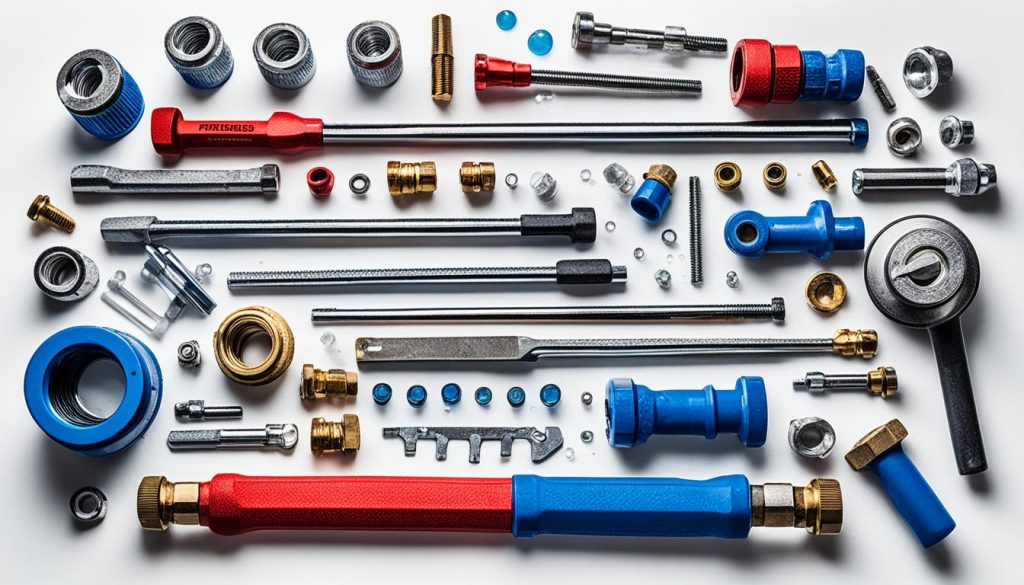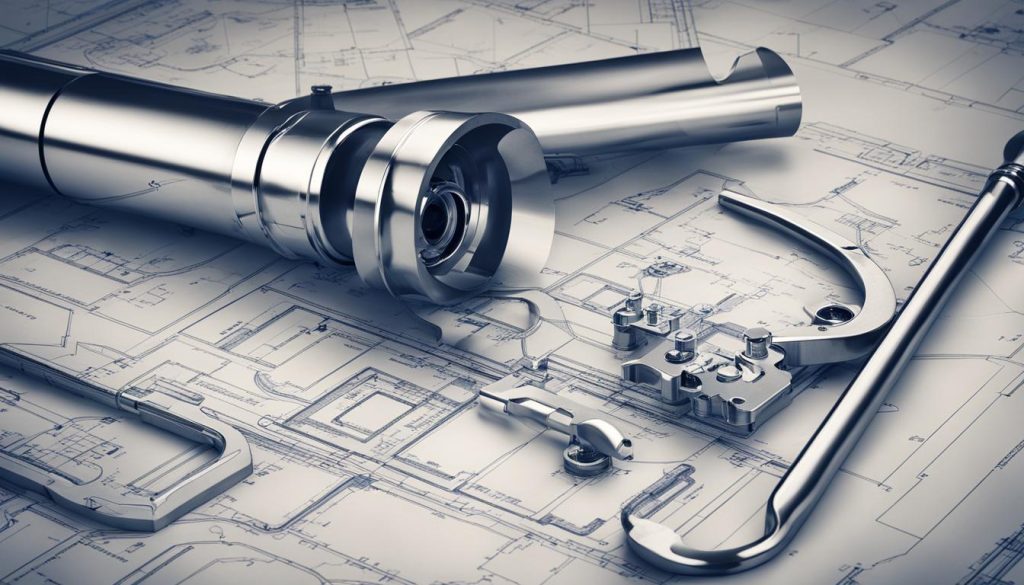Expert Plumbing Engineering Insights & Tips
Did you know that plumbing systems play a vital role in our daily lives, with the average Canadian household using over 473 liters of water per day? From providing clean and reliable water supply to ensuring efficient drainage, plumbing engineering is crucial for maintaining a comfortable and functional living environment. In this comprehensive guide, I will share expert insights and tips to help you optimize your plumbing system, covering everything from plumbing design and solutions to hydraulic systems and drainage design.
Key Takeaways:
- Proper plumbing engineering is essential for efficient water supply and drainage systems.
- The average Canadian household uses over 473 liters of water per day.
- This comprehensive guide provides expert insights and tips to optimize your plumbing system.
- Topics covered include plumbing design, hydraulic systems, and drainage design.
- Implementing these tips can help ensure a comfortable and functional living environment.
The Importance of Regular Plumbing Maintenance
Regular plumbing maintenance is crucial for the longevity and optimal performance of your plumbing system. By conducting regular inspections, checking water pressure, testing drains, inspecting the boiler, ensuring toilet functionality, examining taps, testing sump pumps, inspecting washing machine hoses, addressing leaks promptly, and seeking professional maintenance, you can prevent costly repairs, identify potential issues early on, and ensure the efficient operation of your plumbing system.
Regular inspections allow you to detect any signs of wear and tear or potential problems before they escalate into major issues. By checking the water pressure, you can ensure that it is within the optimal range for your plumbing system, preventing excessive strain on the pipes and fixtures. Testing the drains helps to identify any clogs or blockages that could lead to backups and flooding. An inspection of the boiler allows you to identify any malfunctions or potential safety risks. Ensuring the toilet functionality includes checking for leaks, proper flushing, and proper water level adjustment. Examining taps helps to identify any leaks or issues with water flow. Testing sump pumps ensures that they are functioning correctly and are ready to handle any potential flooding. Inspecting washing machine hoses helps to identify any signs of wear or potential leaks that could cause water damage. Promptly addressing leaks and seeking professional maintenance ensure that any issues are resolved promptly and by qualified professionals, reducing the risk of further damage and costly repairs.
By investing in regular plumbing maintenance, you not only prevent potential problems but also increase the efficiency of your plumbing system. Well-maintained pipes, fixtures, and appliances operate more effectively, leading to improved water flow, reduced water waste, and lower energy consumption. Additionally, regular maintenance helps to extend the lifespan of your plumbing system, saving you money in the long run.
When it comes to plumbing maintenance, prevention is key. By implementing a proactive approach and conducting regular inspections and maintenance, you can avoid emergency calls to plumbers and the inconvenience of disrupted plumbing systems. So, make sure to prioritize regular plumbing maintenance to keep your system running smoothly and prevent any unnecessary plumbing issues.
| Plumbing Maintenance Tasks | Benefits |
|---|---|
| Regular inspections | Identify potential issues early on |
| Checking water pressure | Prevent excessive strain on pipes and fixtures |
| Test drains | Prevent clogs and backups |
| Inspect the boiler | Identify malfunctions and safety risks |
| Ensure toilet functionality | Prevent leaks and ensure proper flushing |
| Examine taps | Identify leaks and water flow issues |
| Test sump pumps | Ensure proper functioning in case of flooding |
| Inspect washing machine hoses | Identify signs of wear and potential leaks |
| Address leaks promptly | Prevent water damage and further plumbing issues |
| Seek professional maintenance | Ensure issues are resolved by qualified professionals |
Tips and Tricks for Preventing Plumbing Issues
As a homeowner, there are several simple yet effective measures you can take to prevent common plumbing issues. By implementing the following tips and tricks, you can maintain a properly functioning plumbing system, save water and energy, and avoid costly repairs.
1. Prevent Clogs
To prevent clogs in your drains, use strainers in sinks, showers, and bathtub drains. These strainers will catch hair, food particles, and other debris, preventing them from causing clogs that can lead to backups and plumbing emergencies.
2. Avoid Chemical Drain Cleaners
Chemical drain cleaners may seem like a quick fix for clogs, but they can cause more harm than good. These harsh chemicals can damage your pipes over time and even worsen clogs. Instead, opt for natural and eco-friendly alternatives or contact a professional plumber for safe and effective drain cleaning solutions.
3. Insulate Pipes
In colder climates, insulating your pipes is essential to prevent freezing and potential burst pipes. Use pipe insulation sleeves or foam pipe wraps to protect your pipes from extreme temperatures and condensation issues.
4. Check for Leaks
Regularly check for leaks in your plumbing system. Inspect visible pipes, faucets, toilets, and under sinks for any signs of water leakage. Addressing leaks promptly can prevent water damage, mold growth, and wasted water.
5. Clean Faucet Aerators and Showerheads
Mineral deposits and sediments can accumulate in faucet aerators and showerheads, leading to reduced water flow and inefficient performance. Regularly clean these fixtures by removing them and soaking them in vinegar overnight. Scrub away any remaining debris and reinstall for improved water flow.
6. Replace Old Fixtures
If your plumbing fixtures are outdated or showing signs of wear and tear, consider replacing them. Old fixtures can be prone to leaks, inefficiencies, and reduced functionality. Upgrading to newer models will improve performance and save water.
7. Flush Water Heater Regularly
Flushing your water heater regularly helps remove sediment buildup, ensuring optimal performance and prolonging its lifespan. Follow the manufacturer’s instructions or consult a professional plumber to properly flush your water heater.
8. Install Low-Flow Fixtures
Installing low-flow fixtures, such as faucets, showerheads, and toilets, is an effective way to conserve water and reduce your utility bills. These fixtures are designed to minimize water consumption without compromising performance.
9. Hire a Professional Plumber
When faced with complex plumbing issues or if you lack the necessary expertise, don’t hesitate to hire a professional plumber. They have the knowledge, skills, and tools to diagnose and resolve plumbing problems efficiently and effectively.
By following these plumbing tips and tricks, you can proactively prevent common plumbing issues, maintain a reliable plumbing system, and enjoy peace of mind in your home.
The Role of a Plumbing Engineer
A plumbing engineer plays a crucial role in the design, installation, and maintenance of plumbing systems for residential, commercial, and industrial buildings. As a plumbing engineer, I take on various responsibilities to ensure the efficient and safe operation of plumbing systems.
Designing Plumbing Systems
One of the primary tasks of a plumbing engineer is to design plumbing systems that meet the specific requirements of a building. This involves creating detailed construction drawings that outline the layout of pipes, fixtures, and fittings. By considering factors such as water supply, drainage, and space constraints, I ensure that the plumbing design is efficient and functional.
Plumbing Analysis and Water Pressure Calculation
I conduct plumbing analysis to determine the optimal sizing of pipes, valves, and other components. This analysis helps to calculate the water pressure requirements for the plumbing system, ensuring adequate flow and preventing issues such as low water pressure or pipe bursts.
Compliance with Regulations and Inspections
It is crucial for plumbing systems to comply with local building and plumbing regulations. As a plumbing engineer, I conduct regular inspections to ensure that the plumbing design and installation meet the required standards. This includes checking for proper venting, backflow prevention, and compliance with health and safety codes.
Cost Estimation and Project Management
I provide cost estimates for plumbing projects, considering factors such as materials, labor, and equipment. This helps clients and contractors to budget effectively for their plumbing installations or renovations. Additionally, I oversee the management of plumbing projects, ensuring that they are completed on time and within budget.
Maintenance and Repair
As part of my role, I oversee the maintenance and repair of plumbing systems. This includes conducting regular maintenance tasks such as clearing clogged drains, inspecting and repairing leaks, and ensuring the proper functioning of fixtures and appliances. Timely maintenance and repair work help to prevent major plumbing issues and extend the lifespan of the system.
Sewer Line Inspections and Grease Trap Maintenance
Inspecting sewer lines is another important aspect of a plumbing engineer’s role. I use specialized equipment to assess the condition of sewer lines, identify blockages or leaks, and recommend appropriate repairs or replacements. Additionally, I oversee the maintenance of grease traps, which play a crucial role in preventing the buildup of grease and solids in plumbing systems.
With expertise in plumbing system design, construction drawings, plumbing analysis, water pressure calculation, compliance with regulations, cost estimates, project management, and maintenance and repair, a plumbing engineer ensures the smooth and efficient operation of plumbing systems in any building.
Plumbing Engineer CV Tips and Skills
When creating a CV as a plumbing engineer, it is essential to highlight your relevant skills and certifications. Employers in the plumbing industry value candidates with a strong foundation in pipefitting, soldering, gas fitting, repairing, installation, troubleshooting, fabrication, leak detection, electrical wiring, and a deep understanding of plumbing codes.
Here are some key tips to consider when crafting your plumbing engineer CV:
- Include a concise summary highlighting your experience in designing, installing, and maintaining plumbing systems.
- Showcase your problem-solving abilities by discussing specific challenges you’ve encountered and the solutions you implemented.
- Highlight relevant certifications you have obtained, such as Certified Plumbing Engineer or Master Plumber.
- Emphasize your teamwork and communication skills, as these are essential for collaborating with architects, contractors, and other professionals in the industry.
- Provide specific examples of projects you have worked on, including details about the scope, timeline, and outcomes.
In addition to the above tips, consider organizing your CV using clear sections and bullet points to enhance readability. A visually appealing and well-structured CV can make a lasting impression on potential employers.
Remember to tailor your CV to each specific job application, highlighting the skills and experiences that align with the job requirements. By crafting a well-rounded and informative CV, you greatly increase your chances of standing out as a qualified plumbing engineer.
| Certification | Issuing Organization |
|---|---|
| Certified Plumbing Engineer | Plumbing Engineers Association |
| Master Plumber | National Plumbing Association |
| Pipefitting Specialist | Trade Skills Institute |
| Gas Fitter Certification | Gas Fitters Board of Canada |
| Leak Detection Technician | Plumbing Contractors Association |
Mistakes to Avoid when Writing a Plumbing Engineer CV
When crafting a plumbing engineer CV, it is crucial to avoid common mistakes that can hinder your chances of landing your dream job. A well-designed CV can effectively showcase your qualifications and stand out from the competition. Here are some key mistakes to avoid:
1. Highlighting Irrelevant Experience
Avoid including irrelevant work experience that does not directly relate to the plumbing engineering field. Focus on highlighting experiences, projects, and achievements that demonstrate your skills and expertise in plumbing systems design, construction, installation, and maintenance.
2. Lack of Certifications
Certifications play a significant role in the plumbing engineering field. Failure to include relevant certifications can create a negative impression on potential employers. Make sure to list any certifications you hold, such as Certified Plumbing Engineer (CPE), Certified Plumbing Designer (CPD), or Certified in Plumbing Engineering (CIPE).
3. Failure to Showcase Skills and Accomplishments
Don’t make the mistake of simply listing your skills without providing specific examples of how you’ve applied them in your previous roles. Showcase your accomplishments, such as successful project completions, cost savings achieved, or innovative solutions implemented.
4. Generic Language
Avoid using generic and vague language in your CV. Be specific and use industry-specific terminology to accurately describe your skills, experiences, and achievements. This will demonstrate your expertise and ensure that your CV resonates with potential employers.
5. Lack of Specific Accomplishments
Don’t miss the opportunity to highlight your specific accomplishments. Include quantifiable achievements whenever possible, such as the number of projects completed, the size and scope of projects, or any awards and recognition received.
6. Poor Formatting
Ensure that your CV is well-organized, easy to read, and visually appealing. Use clear headings, bullet points, and a consistent formatting style. Be mindful of font sizes and spacing to maintain a professional look.
By avoiding these mistakes, you can create a compelling plumbing engineer CV that effectively highlights your qualifications and increases your chances of securing a position in the plumbing engineering industry.
| Mistake | Impact |
|---|---|
| Highlighting Irrelevant Experience | Lack of focus on plumbing engineering skills and experience |
| Lack of Certifications | Questionable level of expertise and commitment |
| Failure to Showcase Skills and Accomplishments | Inability to demonstrate relevant expertise and achievements |
| Generic Language | Lack of specificity and industry knowledge |
| Lack of Specific Accomplishments | Missed opportunity to highlight achievements and impact |
| Poor Formatting | Unprofessional presentation and difficult to read |
Conclusion
Maintaining efficient plumbing systems is crucial for the smooth functioning of any home or building. By implementing the expert insights and maintenance tips shared in this comprehensive guide, you can ensure that your plumbing system operates optimally for years to come. Regular inspections, proper maintenance, and prompt repairs are key to preventing costly plumbing issues and maintaining the efficiency of your system.
Whether it’s preventing clogs, checking for leaks, or replacing old fixtures with more water-efficient alternatives, taking proactive measures will not only save you money but also make your home more sustainable. By following these tips and tricks, you can contribute to water conservation efforts while enjoying an efficient plumbing system.
If you aspire to pursue a career in plumbing engineering, crafting a well-crafted CV is essential. Highlight your relevant skills, certifications, and experience in plumbing system design, installation, and maintenance. Employers seek professionals with expertise in areas such as pipefitting, soldering, gas fitting, and troubleshooting. A comprehensive CV that showcases your skills and accomplishments will enhance your chances of securing a rewarding position as a plumbing engineer.
In conclusion, implementing expert insights, maintaining your plumbing system diligently, and creating a strong CV are crucial steps in achieving efficient plumbing systems and excelling in the field of plumbing engineering. By combining your knowledge and skills with effective communication, you can establish yourself as a proficient professional in the fascinating world of plumbing engineering.
Source Links
- https://www.linkedin.com/pulse/ultimate-plumbing-checklist-insights-from-smartflows-experts-hobson?trk=article-ssr-frontend-pulse_more-articles_related-content-card
- https://resumaker.ai/cv-examples/plumbing-engineer/
- https://www.linkedin.com/pulse/top-10-plumbing-tips-tricks-from-shafer-experts-yxa0e?trk=article-ssr-frontend-pulse_more-articles_related-content-card
- Investing Wisely: How Windows & Doors in Boost Property Value and Financial Health - April 24, 2025
- The Financial Impact of Personal Injuries: Why Legal Help Matters for Business Owners - April 16, 2025
- The Hidden Financial Costs of Domestic Assault: What Business Owners Need to Know - April 16, 2025













